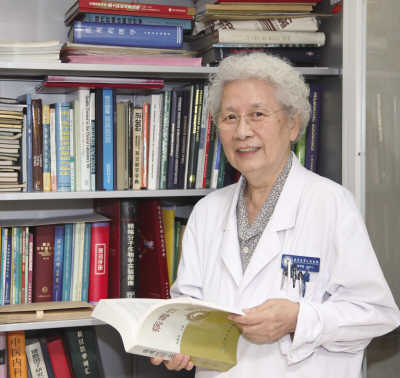Peking University, Mar. 17, 2011: “I can’t wait any longer; Let me take the first shot.”
“Mom will get a shot which might make me sick, so keep away from me for a while,” she told her two children at home.
Returning to her laboratory, she took out the refrigerated hepatitis B vaccine, and injected it into her body with the help of her colleagues.
First director of Peking University (PKU) Hepatology Institute, brave mother of two Tao Qimin was thereafter honored as mother of the hepatitis B vaccine in China. Tao Qimin developed China's first hepatitis B vaccine. She tested it on herself, becoming the first in China to be injected with the vaccine.

A hand stretched out by Hans
In 1963, American scientists discovered for the first time the identification mark of a hepatitis B virus infection -- Australia antigen (AA) -- in an Australian aboriginal’s serum. When AA was named hepatitis B surface antigen in 1972, hepatitis B finally entered the limelight.
"China was closed during the Cultural Revolution. Without ’Doctor Mi’, I could never attain so much,” Tao Said.
The real name of “Doctor Mi” was Hans Miller, a German who came to China in 1939. At Yan’an, he noticed unclear “abdominal distention” symptoms. Assistant dean of Beijing Medical School at that time, he realized, “Nine times out of ten, it is hepatitis B!”
At that time, China rarely communicated with the external world. In 1972, during a family visit in Japan with his wife Nakamura Kyoko, Hans brought back several hepatitis B kits.
“’Doctor Mi’ convened a meeting with a few hospitals after his return, inquiring as to who would like to take charge of the research. Then I raised my hand,” Tao recalled.
Japanese shocked
As the saying goes, “If you have no hand, you can't make a fist”. Tao needed to first isolate the virus before she could research it. In China’s harsh year of 1973, Hans repeatedly sent Tao to study the latest hemagglutination detection technology in Japan.
After her return, the Japanese HBV cassettes were already nearly used up, leaving little possibility to launch a large-scale sample survey. “We’ll just do it on our own,” Tao said. After only four months, she had created a set of HBV detection kits independently, astonishing Japanese experts.
Kits were applied across the nation. Through the expanding data set being collected, she discovered the rate of AA positive individuals among Chinese people approximated 10%.
"Having worked clinically for so many years, I was quite clear of the difficulties in hepatitis B treatment," Tao Qimin admitted, speaking of hepatitis B. Finding a vaccine seemed to be the best solution.
In 1975, in the journal Science, Tao Qimin saw a report from United States researchers who had isolated the virus from its carrier, inactivated it and injected it into a gorilla. Without any hepatitis B symptoms, the gorilla began to generate HBV antibodies.
"Immediately I knew how to make it - Isn’t it centrifugal?” Tao was an expert in centrifugal work, and could perform centrigal work without standard equipment. "It seemed to be 3000 revolutions per minute. With electron microscopy, I observed the bottom layer of the tube showed no large virus particles but surface antigens everywhere. The pure surface antigens could be used to make vaccines!" said Tao Qimin. Shortly after on July 1, 1975, China’s first hepatitis B vaccine (Code 7571) was created in Tao Qimin’s hand.
First test injection
According to international practice, developed hepatitis B vaccines should be tested on gorillas before on humans. The first hepatitis B vaccine was frozen until an appropriate test subject could be located.
"Everybody was worried at that time," but Tao could not find available gorilla.
“I can’t wait any longer; I should get the first shot,” Tao decided.
"There was no need to inform my husband for he was out of the city for a whole year, while my two little children would always do what I said," Tao said.
After the injection, she took her body temperature every day and performed weekly blood tests. A week later, no antigens were found, neither were there any a month later. After three months, antibodies appeared instead, indicating she had gained HBV immunity successfully without infection.
They succeeded!
In arrangement with the Ministry of Health, Tao donated the vaccine technology and the entire production process. Since then, hepatitis B vaccine has gradually begun to be popularized domestically.
In the past 35 years, the percentage of HBV carriers in China by the hepatitis b virus has dropped from 10% to 7%; the rate of HBV infections in children under 5 years of age has fallen dramatically from 5% to 0.3%.
Tao has offered outpatient services at PKU People's Hospital, rain or shine, for 35 years. Now, aged over 80, she still maintains two days of outpatient service a week.
On the day of the exclusive interview, though just off the outpatient service, Tao was clear-minded and not a bit tired. When it comes to the title she received lately, “Beijing’s Top 10 Health Guard”, the senior responded somewhat abashedly, “An old lady like myself is incompetent as a guard. How I wish to witness the elimination of HBV for the rest of my life! And I believe that it is not far away.”
Translated by: Wang Jingran
Edited by: Arthars
Source: Healthy Times